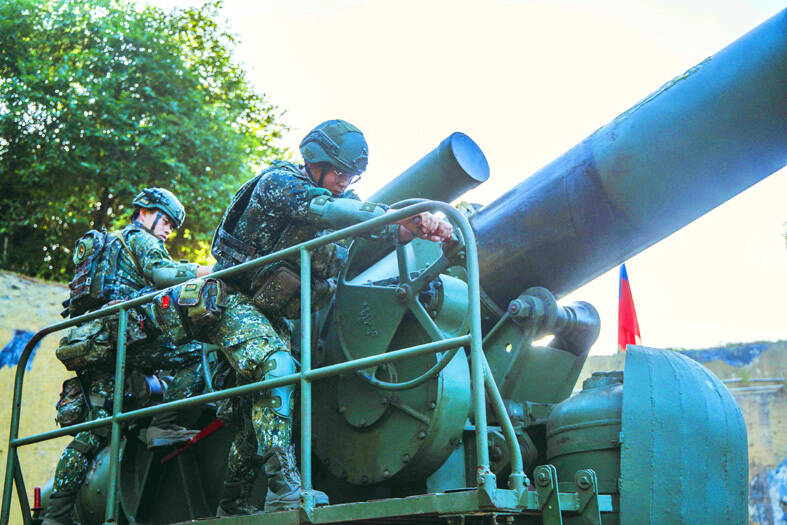Taiwan must increase its defense spending as a percentage of its GDP beyond that already recently pledged by President William Lai (賴清德) to demonstrate to foreign states willing to offer support that Taipei is taking the threat against it seriously, an article by Council of Foreign Relations fellow for Asia studies David Sacks said on Friday.
Sacks was referring to Lai’s comments on Tuesday, stating that the nation’s defense spending budget for next year would be an estimated NT$647 billion (US$19.94 billion), which is an increase of 6 percent from this year’s defense spending.
However, in the eyes of most foreign observers, such an increase still showed that “Taiwan is still not taking the existential threat that it faces seriously enough,” Sacks said.

Photo: Ministry of National Defense/AFP
The only metric most observers use is the percentage of a nation’s GDP that it allocates for defense spending, he added
Nearly 20 years after former president Chen Shui-bian (陳水扁) pledged to increase Taiwan’s defense spending to three percent of GDP in 2007, the nation has yet to meet that target, Sacks said.
Taiwan’s defense spending falls behind countries in a similar situation, Sacks said, citing Israel’s 2022 defense spending, which was 4.5 percent of its GDP, as an example.
“On the current trajectory, Taiwan risks falling further behind the PLA,” Sacks said in the article.
China’s higher defense spending baseline would mean that the gap between Taiwan’s and China’s military spending would only increase further, he added.
Sacks said that Taiwan’s defense spending is equivalent to roughly 2.5 percent of GDP, exceeding the baseline set for NATO members.
However, Tsai was unable to “lead a cultural shift within Taiwan’s Ministry of National Defense (MND), which is known for its conservatism, its attachment to legacy platforms such as fighter jets and large surface warships, and its skepticism toward adopting an asymmetric approach to defense,” Sacks said.
Lai’s appointment of Wellington Koo (顧立雄), the nation’s third civilian defense minister, demonstrates his understanding that the MND must undergo a shakeup, he said.
The urgently needed increase in Taiwan’s defense spending should go toward creating more incentives to attract civilians to join the military after officially transitioning from a conscription-based military to an all-volunteer force, as well as covering the costs of the increased scrambling of jets and deploying of ships in response to PLA naval exercises, he said.
Sacks added that the development and production of drones, uncrewed systems and stockpiling munitions as part of an asymmetric strategy, and producing additional hulls to make its significant upfront investment in its indigenous submarine program pay off, would also benefit from higher defense spending budgets.

Alain Robert, known as the "French Spider-Man," praised Alex Honnold as exceptionally well-prepared after the US climber completed a free solo ascent of Taipei 101 yesterday. Robert said Honnold's ascent of the 508m-tall skyscraper in just more than one-and-a-half hours without using safety ropes or equipment was a remarkable achievement. "This is my life," he said in an interview conducted in French, adding that he liked the feeling of being "on the edge of danger." The 63-year-old Frenchman climbed Taipei 101 using ropes in December 2004, taking about four hours to reach the top. On a one-to-10 scale of difficulty, Robert said Taipei 101

Nipah virus infection is to be officially listed as a category 5 notifiable infectious disease in Taiwan in March, while clinical treatment guidelines are being formulated, the Centers for Disease Control (CDC) said yesterday. With Nipah infections being reported in other countries and considering its relatively high fatality rate, the centers on Jan. 16 announced that it would be listed as a notifiable infectious disease to bolster the nation’s systematic early warning system and increase public awareness, the CDC said. Bangladesh reported four fatal cases last year in separate districts, with three linked to raw date palm sap consumption, CDC Epidemic Intelligence

Two Taiwanese prosecutors were questioned by Chinese security personnel at their hotel during a trip to China’s Henan Province this month, the Mainland Affairs Council (MAC) said yesterday. The officers had personal information on the prosecutors, including “when they were assigned to their posts, their work locations and job titles,” MAC Deputy Minister and spokesman Liang Wen-chieh (梁文傑) said. On top of asking about their agencies and positions, the officers also questioned the prosecutors about the Cross-Strait Joint Crime-Fighting and Judicial Mutual Assistance Agreement, a pact that serves as the framework for Taiwan-China cooperation on combating crime and providing judicial assistance, Liang

US climber Alex Honnold left Taiwan this morning a day after completing a free-solo ascent of Taipei 101, a feat that drew cheers from onlookers and gained widespread international attention. Honnold yesterday scaled the 101-story skyscraper without a rope or safety harness. The climb — the highest urban free-solo ascent ever attempted — took just more than 90 minutes and was streamed live on Netflix. It was covered by major international news outlets including CNN, the New York Times, the Guardian and the Wall Street Journal. As Honnold prepared to leave Taiwan today, he attracted a crowd when he and his wife, Sanni,